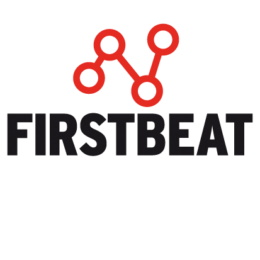
Stress – a physiological response we often try to avoid. But however much we try, we all experience it in some form as it is very much needed to succeed in life. Find the right balance between stress and recovery to turn stress into an opportunity.
No meaningful life is stress-free because stress actually helps us succeed. It is an unavoidable and normal physiological response when you experience challenges.
In fact, stress can be positive. Positive stress activates us when needed but does not interfere with recovery when we rest. On the other side of the coin, however, is negative stress. Negative stress keeps the body in overdrive and impairs recovery during the day and night.
Stress levels are governed by the autonomic nervous system (ANS), which is divided into two: the parasympathetic and sympathetic nervous systems. The parasympathetic nervous system restores and maintains the body’s resting condition, while the sympathetic nervous system prepares the body to meet challenges. ANS function can be assessed noninvasively by measuring heart rate and heart rate variability (HRV).
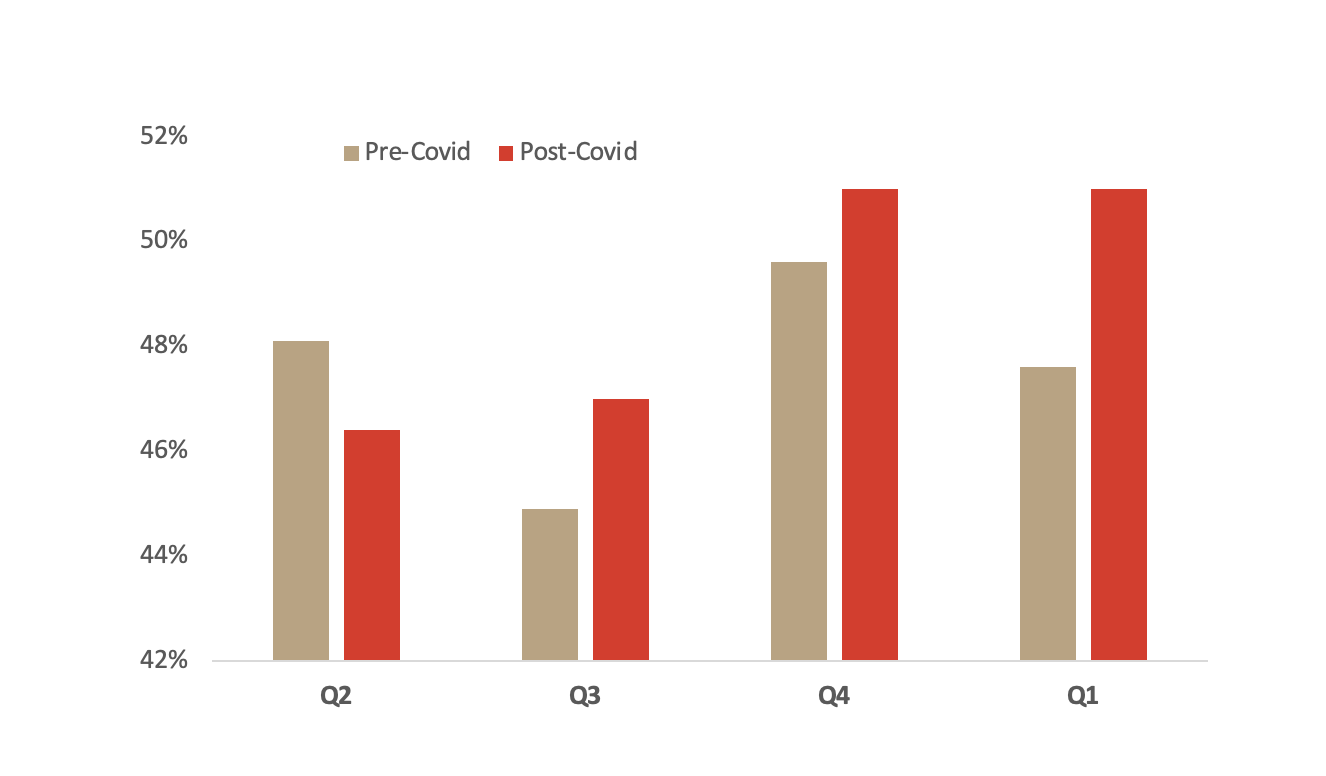
Picture 1: Managing stress and recovery is on everyone’s agenda right now. The prolonged Covid-19 pandemic seems to have increased the perceived stress. The graph, based on Firstbeat database, represents a comparison to the results of the same period in earlier years (2017-2019).
How Can You Manage Stress and Recovery to Find Better Balance?
Many factors contribute towards load, including physical, psychological, social and cognitive stressors that our body and mind encounter. Whether our resources increase or decrease is dependent on both work and leisure time activities.
Stress is ok providing you have enough recovery to balance it. Some specialists even say that there is no such thing as too much stress but just not enough recovery. By focusing on relaxing and energizing activities, you can ensure your resources are not decreasing and manage stress.
Recovery means a lowered activation level in the body in the absence of stress factors. Parasympathetic activation dominates the ANS – and your body’s battery is recharged. Without sufficient recovery, your risk of getting overloaded increases.
Good recovery starts during the day. Still Firstbeat’s database, consisting of hundreds of thousands of measurements, reveals that almost 50 % of people have poor levels of recovery during workdays.
Thankfully, there are ways of ensuring that you recover enough. Firstly, make sure you are getting the recommended seven to nine hours of sleep per night. During the day, effective ways to recover include taking microbreaks like grabbing a cup of tea, listening to music, taking a nap, or strolling around in the nature.
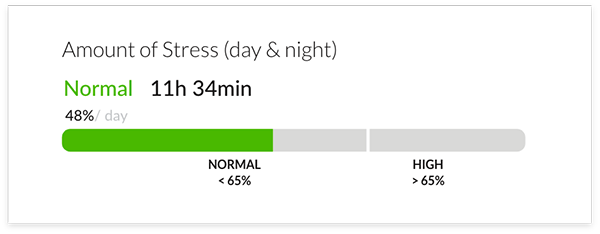
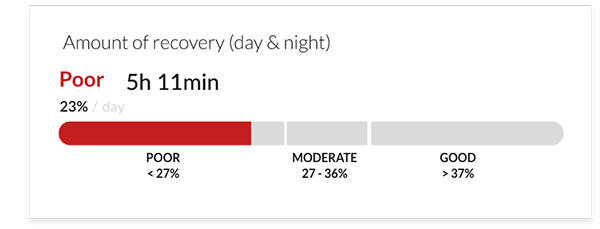
Picture 2: Firstbeat Life is a personal health and wellness solution focusing on helping users to manage stress and recovery. For a quantitative overview, the Firstbeat Life scores indicate whether your stress and recovery are in balance, so you can act when required.
When Are We Most Stressed?
Stress is an individual reaction. We all have our own schedules and stressors that are often tied to our current life situation. The good news is that it is completely normal to have those more stressful times – just try to make sure that there is enough recovery in the long-term.
According to Firstbeat’s database, the end of the week and year are when we seem to be the most stressed and recover less. The end of the week is also when our resources tend to be at their lowest, so ensure that you find the time to do the things you enjoy over the weekend and get that all-important recovery time.
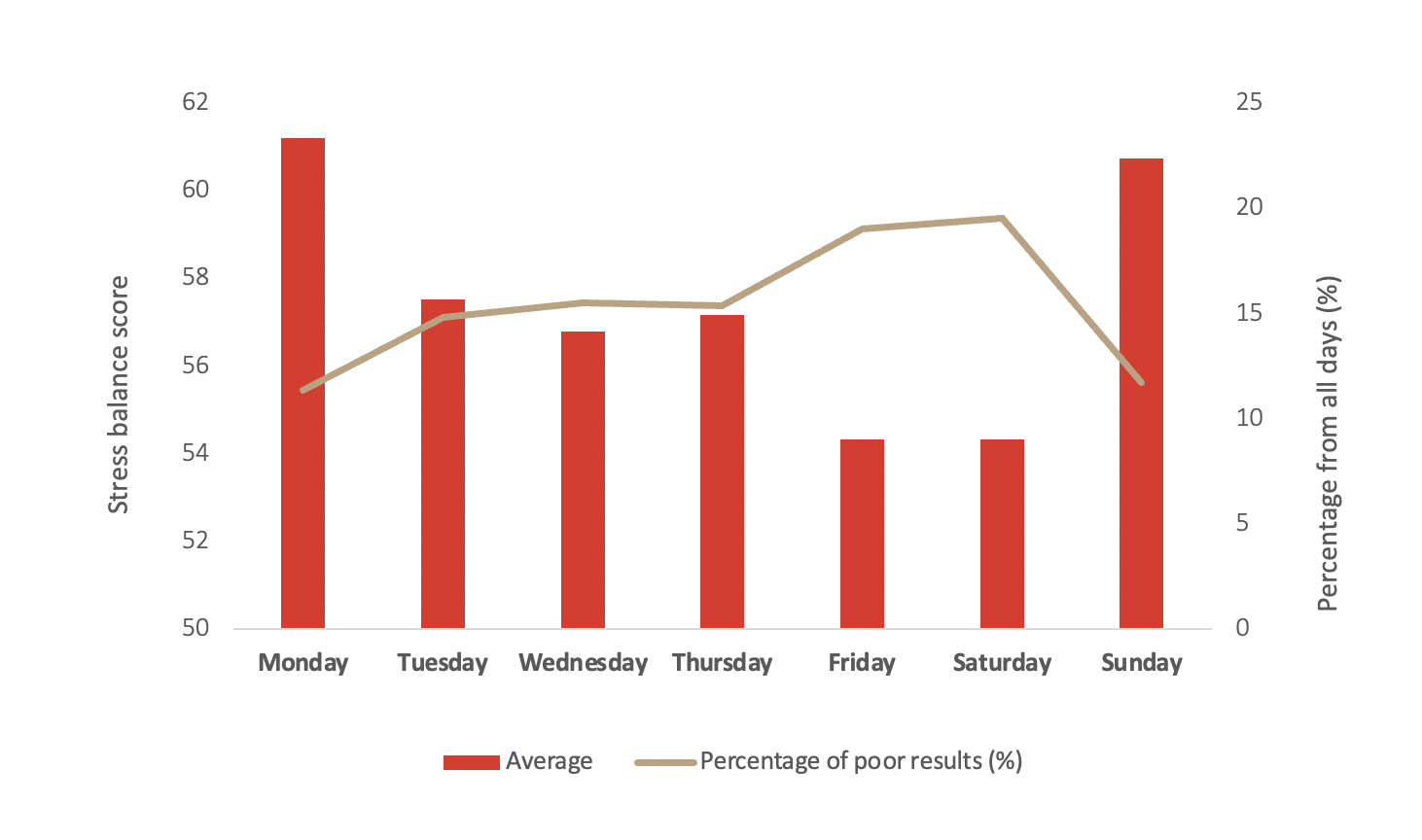
Picture 3: The balance between stress and recovery weakens towards the end of the week as the load accumulates according to Firstbeat database insights. The results show the score of stress and recovery balance on different days of the week and the percentage of the poor result from all measurement days.
How to Recognize Overload Proactively?
Various internal and external factors contribute to feeling stressed. If your overload becomes chronic and you don’t balance stress with enough recovery, it can lead to more serious problems, such as burnout or health issues. It is important to learn to identify the causes of excessive stress and do something about them proactively.
Most of us are often quite poor at evaluating our own stress and recovery balance. However, there are many signs that you can spot – and the earlier the better – to avoid ending up with overload and burnout.
When there is too much load in your life, you may feel:
- Always tired
- Increasingly irritable
- The satisfaction of completing tasks is no longer there
- You are struggling to sleep
- It’s more difficult to concentrate
As an employer, colleague or friend you might look out for:
- Person appears detached from their work and colleagues
- A usually reliable person is starting to miss deadlines
- Mood swings
- Increased sick leave
- Working more overtime hours (as they try to keep on top of work)
Objective measurement data can also provide valuable insights. By using Firstbeat Life, you can see how much stress you are experiencing, monitor your resources and identify potential risks proactively. If your data shows continuous overload and too much stress, you might get a notification via the app that reminds you to pay attention to excess stress and advice on how to avoid overload going forward.
How Does Physical Activity and Exercise Affect Stress Management?
Physical activity is a form of acute stressor on your body as it activates the sympathetic nervous system. However, it has been shown that regular exercise and good fitness produce physiological adaptations in the long run that improve your body’s ability to adjust to stress. A study that used Firstbeat measurement data shows that physical activity is associated with lower objective stress on workdays.
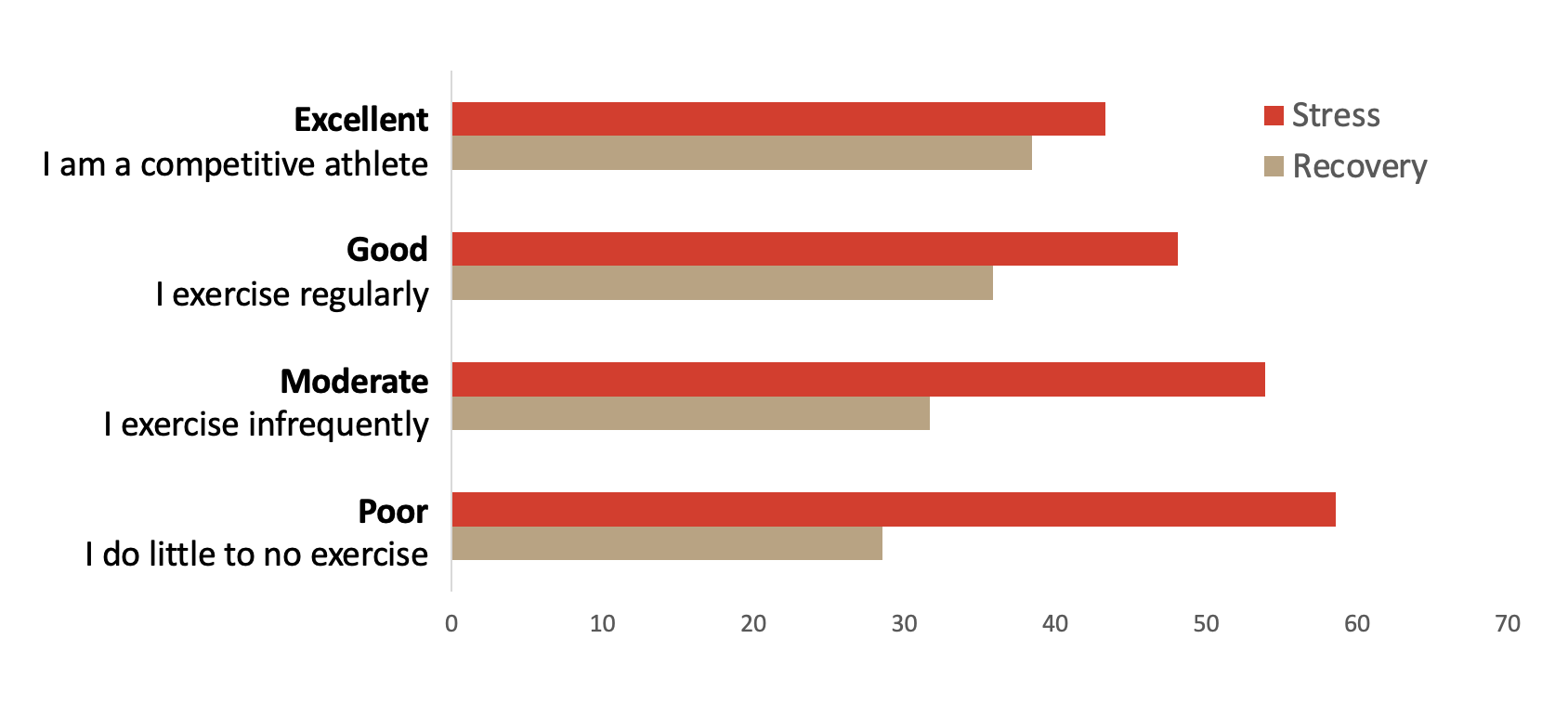
Picture 4. Low physical activity level is associated with poor recovery. Firstbeat big data shows how individuals who exercise little have significantly more stress and less recovery than individuals who are physically active. Sufficient physical activity supports adequate recovery and stress management.
During the pandemic and hybrid working period, the number of passive workdays (below 1000 steps per day) has dramatically increased, with those already the most inactive seeing the most dramatic results. To ensure you’re getting enough physical activity, you should find an activity you enjoy and that fit into your daily life. It is worth remembering, any activity is better than no activity! Try different routines (exercising before or after work, for example) to settle on the activities that best suit your lifestyle.
How Is Sleep Connected to Stress?
Based on Firstbeat database only one in three people have the recommended amount of recovery during sleep. Considering one of the main purposes of sleep is to replenish the body physiologically and psychologically, not getting enough restorative sleep can adversely affect your resources and how you perform the following day.
Restorative sleep reduces stress, so how can you ensure you get enough of it? Restorative sleep can be improved by ensuring you’re getting enough sleep in the first place. However, it is important to note that getting enough sleep does not mean getting enough recovery. Your daily choices really matter – getting enough physical activity (and at the right time) during the day and ensuring you’re eating foods with good nutrition at regular times can affect your ability to recover during night.
How Can I Optimize And Manage Stress?
We are all individuals, and the key is to find your optimal stress point. That’s why it’s important to find out what works best for you and to build your stress management skills.
By experimenting and understanding your personal reactions and resources, you can learn to perform your best. Stress is cyclical but in the long-term, you should feel energized and productive enough to be well and enjoy life.
Why not start today! By incorporating healthy routines step by step such as keeping fit and taking microbreaks during the day, you can give yourself the best chance of increasing recovery in everyday life. You can find more tips in our expert blogs:
- How to ensure you’re balancing your stress with enough recovery
- How to get good quality sleep
- How to benefit from microbreaks
Monitoring your body’s reactions can also motivate and offer insights into what are the biggest stressors of your day. Firstbeat Life gives you reliable, quantifiable analysis on your stress and recovery, with personalized guidance on how to improve, so you can always be in control of your balance.
Test How Your Daily Choices Affect Your Stress and Recovery
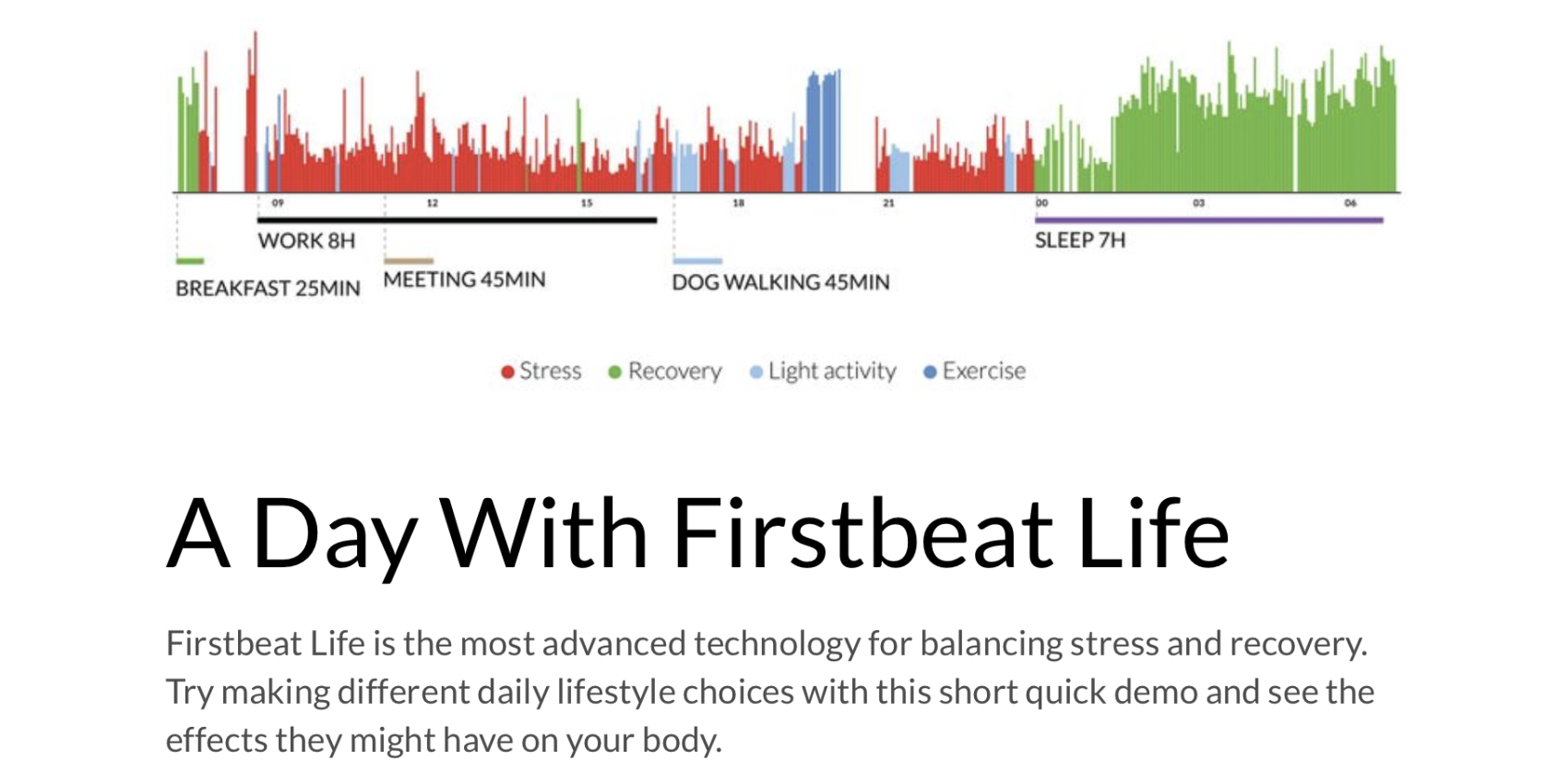
Firstbeat Life is the leading platform for physiology based coaching. It offers you a unique capability to succeed in the growing market for proactive health and well-being services. Utilize world-class physiological measurements to enhance your service offerings. Learn more about Firstbeat Life.
You might also be interested in
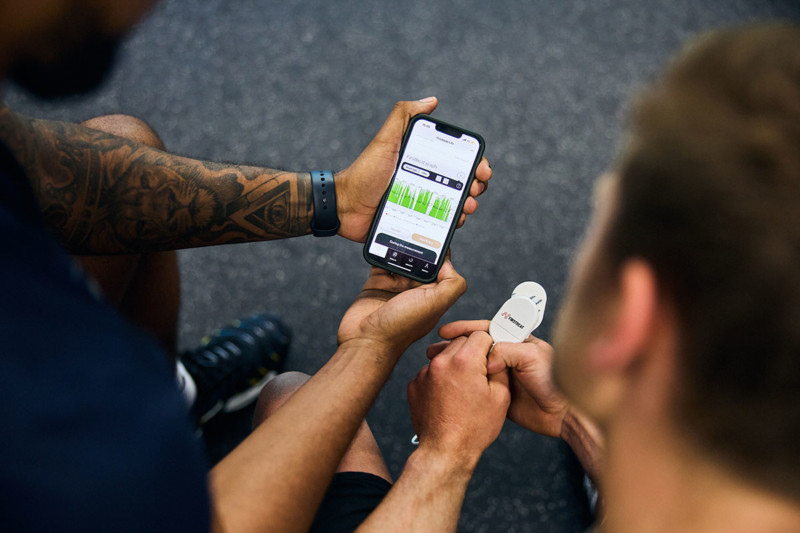
How to Utilize Wellness Data to Become a Highly Successful Personal Trainer
The UK’s top PTs explain how data is integral to offering a better service and growing your business. The Personal Training landscape has changed significantly in the last few years….

Firstbeat Life: How Do You Get Employees Engaged in Corporate Wellness?
When it comes to corporate wellness, one of the most common problems is getting employees engaged. So, what to do? Our specialist gives concrete tips, how to get employees commit to small changes.
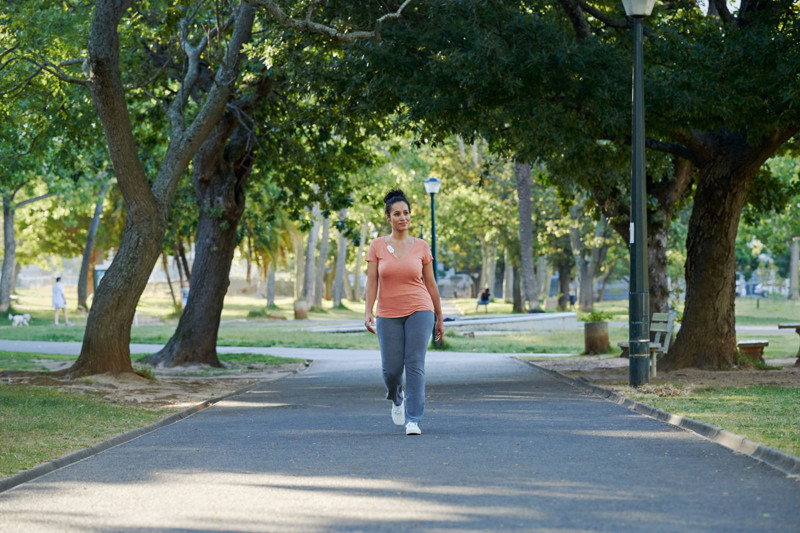
New Study Reveals that the Firstbeat Fitness Level Walk is a Valid Tool for Cardiorespiratory Fitness Evaluation in Clinical Populations
Cardiorespiratory fitness (measured as VO2max) is an expression of the body’s ability to deliver and utilize oxygen for energy during physical exercise. It reflects the interplay between respiratory, cardiovascular, and…
